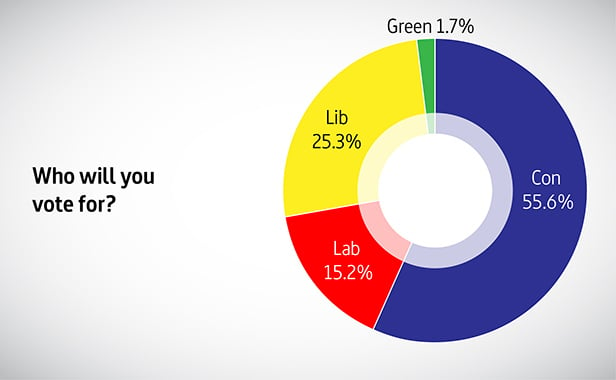Partners back May to win as they predict tough times ahead
Just 1% of partners believe Labour will win today's election as they brace themselves for challenging market conditions ahead
June 08, 2017 at 04:39 AM
5 minute read
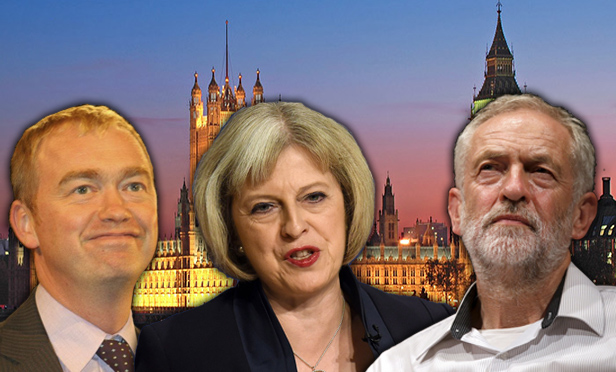 Partners are intending to back Theresa May and the Conservative Party to win today's UK general election, according to a Legal Week survey that shows confidence levels falling among City partners.
Partners are intending to back Theresa May and the Conservative Party to win today's UK general election, according to a Legal Week survey that shows confidence levels falling among City partners.
More than half of the nearly 200 survey respondents (56%) said they planned to vote for the Conservative party, with the Liberal Democrats looking set to secure the next largest share of the group's vote at 25%.
Only 15% of those taking part in Legal Week's latest Big Question survey, carried out before polling stations opened earlier today, said they intended to vote for the Labour Party.
The overwhelming majority of respondents (87%) said they expected the Conservatives to win the election. Four percent said they anticipate a landslide Tory victory, 42% expect a comfortable majority for the party, with a further 41% believing May will edge a slim majority.
Only 12% said they anticipated a minority government, with voting equally split between the Conservatives or Labour at the helm. Just 1% believe Labour could achieve a majority.
Despite their conviction that the Conservatives will win, many of those taking part in the survey expressed disappointment at how the election has been run.
One partner said: "I still expect the Conservatives to win but they've run a very poor campaign and, in the process, alienated many who don't usually vote for them but on this occasion were prepared to, and they have even turned away many core Tory supporters."
May's performance to date as prime minister has failed to win over many of those taking part in the survey. While 29% described her performance as excellent or above average, 37% described it as average, with almost the same percentage (34%) describing her performance as below average or very poor.
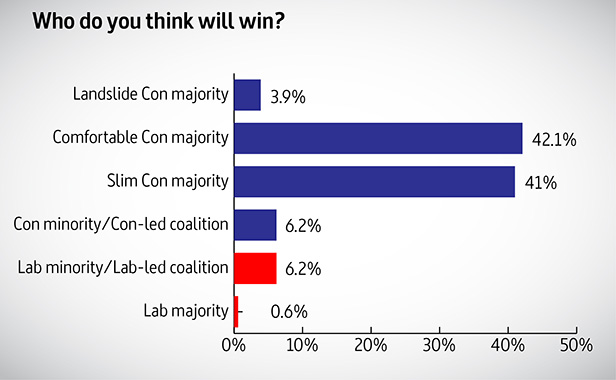 One partner commented: "A deeply unimpressive campaign by Mrs May. She had enough cards in her hand to win by 200 seats. Her parroting of empty slogans in answer to perfectly legitimate questions and her uncomfortable and defensive manner hardly inspire confidence."
One partner commented: "A deeply unimpressive campaign by Mrs May. She had enough cards in her hand to win by 200 seats. Her parroting of empty slogans in answer to perfectly legitimate questions and her uncomfortable and defensive manner hardly inspire confidence."
Despite this, the majority of respondents think May would be the best Brexit negotiator for the UK, securing 63% of the vote, ahead of Labour's Jeremy Corbyn on 9% and the Liberal Democrats' Tim Farron on 7%.
Labour MP Keir Starmer, the shadow Brexit secretary, received almost as many votes as Farron, despite not being listed as an option on the survey.
Partners' reasoning for planning to vote Conservative is demonstrated by their belief that the party offers the best hope for business. More than 75% of those taking part said the Conservatives have the most business-friendly policies out of all of the parties, followed by 17% arguing in favour of the Liberal Democrats, with Labour gaining just 7% of the vote.
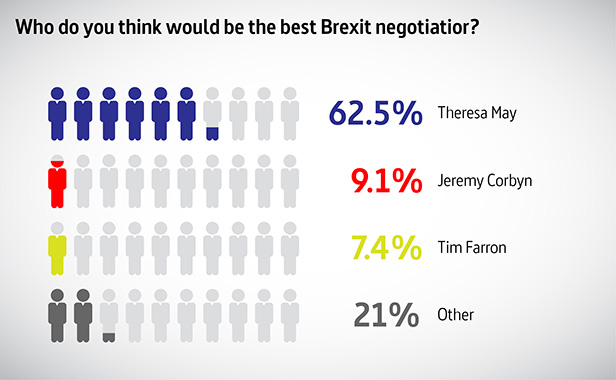 Nearly half of those taking part in the survey believe business activity levels will decline either a little or a lot during the next 12 months regardless of who wins, with 24% predicting activity levels will stay the same, and 28% expecting an improvement.
Nearly half of those taking part in the survey believe business activity levels will decline either a little or a lot during the next 12 months regardless of who wins, with 24% predicting activity levels will stay the same, and 28% expecting an improvement.
Almost half of respondents (42%) said Brexit had already caused their business levels to decline, with a smaller percentage (27%) stating that the general election had caused a decline in activity levels.
Simmons & Simmons managing partner Jeremy Hoyland said: "Has the snap election created some uncertainty in clients' minds and reduced some investment? Probably a bit. But it pales into insignificance compared to Brexit. Hopefully when we get in on Friday there will be a bounceback in some transactional areas. I'm not expecting a sudden bounce, but I guess if the Conservatives win big (although that doesn't look likely) there may be some increased appetite."
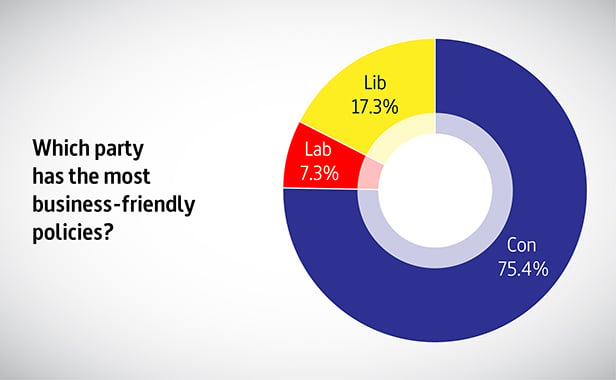 Practices expected to be hit most by the decline in activity include real estate and corporate. Regional managing partner for UK, US and EMEA at Herbert Smith Freehills, Ian Cox, said: "The initial period post-Brexit vote was one of disbelief and for a short time many businesses ground to a halt while they digested the result, but I think now we're at a new normal. We're probably seeing slightly lower levels of activity but not markedly so. "Real estate initially suffered a bit of a downturn – but the first half of this year has seen very busy central London markets, partly due to increased overseas interest triggered in part by the devaluation in sterling."
Practices expected to be hit most by the decline in activity include real estate and corporate. Regional managing partner for UK, US and EMEA at Herbert Smith Freehills, Ian Cox, said: "The initial period post-Brexit vote was one of disbelief and for a short time many businesses ground to a halt while they digested the result, but I think now we're at a new normal. We're probably seeing slightly lower levels of activity but not markedly so. "Real estate initially suffered a bit of a downturn – but the first half of this year has seen very busy central London markets, partly due to increased overseas interest triggered in part by the devaluation in sterling."
Conversely, the two practice areas that partners expect to be the busiest in the next 12 months are regulatory and litigation.
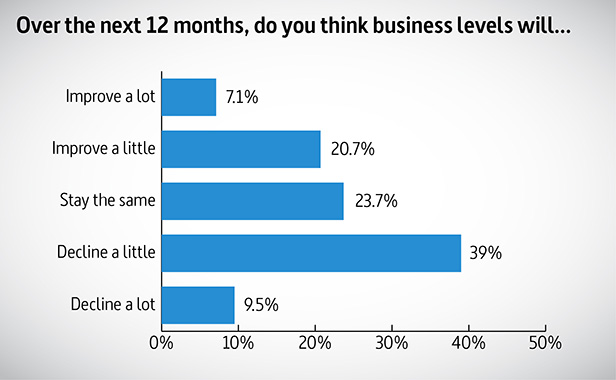 If the election results in a hung parliament, with no overall majority, many partners believe business will decline.
If the election results in a hung parliament, with no overall majority, many partners believe business will decline.
Kennedys senior partner Nick Thomas said: "I would not want to see a hung parliament, I am sure the market will hedge against that risk, but we will see the usual headless chicken panicking if we get anything except a Tory government, therefore I'd hope that there will be a firm decision."
Baker McKenzie London managing partner Alex Chadwick said: "Like many of our clients though, we would prefer a clear result tomorrow – all business wants to avoid further uncertainty and be able to plan ahead."
This content has been archived. It is available through our partners, LexisNexis® and Bloomberg Law.
To view this content, please continue to their sites.
Not a Lexis Subscriber?
Subscribe Now
Not a Bloomberg Law Subscriber?
Subscribe Now
NOT FOR REPRINT
© 2025 ALM Global, LLC, All Rights Reserved. Request academic re-use from www.copyright.com. All other uses, submit a request to [email protected]. For more information visit Asset & Logo Licensing.
You Might Like
View All
International Arbitration: Key Developments of 2024 and Emerging Trends for 2025
4 minute read
The Quiet Revolution: Private Equity’s Calculated Push Into Law Firms
5 minute read
'Almost Impossible'?: Squire Challenge to Sanctions Spotlights Difficulty of Getting Off Administration's List
4 minute read
Trending Stories
- 1Stevens & Lee Names New Delaware Shareholder
- 2U.S. Supreme Court Denies Trump Effort to Halt Sentencing
- 3From CLO to President: Kevin Boon Takes the Helm at Mysten Labs
- 4How Law Schools Fared on California's July 2024 Bar Exam
- 5'Discordant Dots': Why Phila. Zantac Judge Rejected Bid for His Recusal
Who Got The Work
Michael G. Bongiorno, Andrew Scott Dulberg and Elizabeth E. Driscoll from Wilmer Cutler Pickering Hale and Dorr have stepped in to represent Symbotic Inc., an A.I.-enabled technology platform that focuses on increasing supply chain efficiency, and other defendants in a pending shareholder derivative lawsuit. The case, filed Oct. 2 in Massachusetts District Court by the Brown Law Firm on behalf of Stephen Austen, accuses certain officers and directors of misleading investors in regard to Symbotic's potential for margin growth by failing to disclose that the company was not equipped to timely deploy its systems or manage expenses through project delays. The case, assigned to U.S. District Judge Nathaniel M. Gorton, is 1:24-cv-12522, Austen v. Cohen et al.
Who Got The Work
Edmund Polubinski and Marie Killmond of Davis Polk & Wardwell have entered appearances for data platform software development company MongoDB and other defendants in a pending shareholder derivative lawsuit. The action, filed Oct. 7 in New York Southern District Court by the Brown Law Firm, accuses the company's directors and/or officers of falsely expressing confidence in the company’s restructuring of its sales incentive plan and downplaying the severity of decreases in its upfront commitments. The case is 1:24-cv-07594, Roy v. Ittycheria et al.
Who Got The Work
Amy O. Bruchs and Kurt F. Ellison of Michael Best & Friedrich have entered appearances for Epic Systems Corp. in a pending employment discrimination lawsuit. The suit was filed Sept. 7 in Wisconsin Western District Court by Levine Eisberner LLC and Siri & Glimstad on behalf of a project manager who claims that he was wrongfully terminated after applying for a religious exemption to the defendant's COVID-19 vaccine mandate. The case, assigned to U.S. Magistrate Judge Anita Marie Boor, is 3:24-cv-00630, Secker, Nathan v. Epic Systems Corporation.
Who Got The Work
David X. Sullivan, Thomas J. Finn and Gregory A. Hall from McCarter & English have entered appearances for Sunrun Installation Services in a pending civil rights lawsuit. The complaint was filed Sept. 4 in Connecticut District Court by attorney Robert M. Berke on behalf of former employee George Edward Steins, who was arrested and charged with employing an unregistered home improvement salesperson. The complaint alleges that had Sunrun informed the Connecticut Department of Consumer Protection that the plaintiff's employment had ended in 2017 and that he no longer held Sunrun's home improvement contractor license, he would not have been hit with charges, which were dismissed in May 2024. The case, assigned to U.S. District Judge Jeffrey A. Meyer, is 3:24-cv-01423, Steins v. Sunrun, Inc. et al.
Who Got The Work
Greenberg Traurig shareholder Joshua L. Raskin has entered an appearance for boohoo.com UK Ltd. in a pending patent infringement lawsuit. The suit, filed Sept. 3 in Texas Eastern District Court by Rozier Hardt McDonough on behalf of Alto Dynamics, asserts five patents related to an online shopping platform. The case, assigned to U.S. District Judge Rodney Gilstrap, is 2:24-cv-00719, Alto Dynamics, LLC v. boohoo.com UK Limited.
Featured Firms
Law Offices of Gary Martin Hays & Associates, P.C.
(470) 294-1674
Law Offices of Mark E. Salomone
(857) 444-6468
Smith & Hassler
(713) 739-1250





